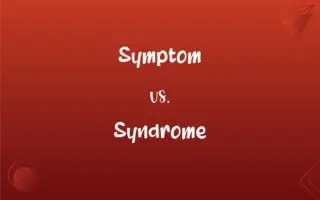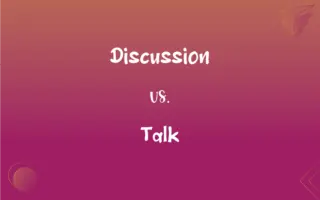Unorganized vs. Disorganized: What's the Difference?
By Janet White & Harlon Moss || Updated on March 4, 2024
Unorganized refers to lacking a formal structure or system, whereas disorganized implies a state of disorder or inefficiency within an existing structure.

Key Differences
Unorganized and disorganized are terms that describe different types of orderliness, or rather, the lack thereof. Unorganized typically refers to the absence of any organized system or structure from the beginning. It suggests that there has never been an attempt to organize, or that organization is not inherent to the subject. Disorganized, on the other hand, implies that there was an attempt to create order or that an organized system was in place, but it has fallen into disorder. This term is often used to describe situations where there is inefficiency, chaos, or clutter due to poor organization.
In essence, being unorganized is about the absence of organization, suggesting a neutral state where organization has not been considered or is not applicable. Disorganized, however, carries a negative connotation, indicating a failure to maintain order or efficiency in an area where some level of organization was expected or required.
This distinction is crucial in various contexts, including work environments, personal spaces, and data management. In a workplace, an unorganized team may simply lack defined roles or processes, whereas a disorganized team may struggle with inefficiency despite having established roles and procedures. Similarly, in data management, unorganized data might just be uncategorized, while disorganized data could be misfiled, making it hard to locate or use effectively.
Understanding the difference between unorganized and disorganized can help in identifying the appropriate approach to improve efficiency, whether it involves establishing a new system of organization or reorganizing an existing one to restore order and functionality.
Comparison Chart
Definition
Lacking a formal structure or system
Inefficiency or disorder within an existing structure
ADVERTISEMENT
Connotation
Neutral, absence of organization
Negative, failure of organization
Example Context
A newly formed group without roles
A team with roles that fails to meet goals due to poor organization
Solution
Implement a structure or system
Reorganize or improve existing systems
Implication
No attempt at organization
Attempt at organization has been made but is unsuccessful
Unorganized and Disorganized Definitions
Unorganized
Lacking structure.
The new club is still unorganized and has no official members.
ADVERTISEMENT
Disorganized
State of clutter.
His disorganized workspace affects his productivity negatively.
Unorganized
Neutral state.
The documents are unorganized, simply piled without order.
Disorganized
Inefficiency.
The project team is disorganized, missing deadlines and meetings.
Unorganized
Fresh start.
We're an unorganized group, just starting to define our goals.
Disorganized
Need for reorganization.
The file system is disorganized, requiring a complete overhaul.
Unorganized
Without system.
His collection of books is unorganized, spread randomly across the room.
Disorganized
Past organization.
The library's disorganized shelves suggest a lack of recent maintenance.
Unorganized
Absence of planning.
The meeting was unorganized, with no agenda set beforehand.
Disorganized
Failed system.
Despite efforts, her desk remained disorganized with papers everywhere.
Unorganized
Lacking order, unity, or a system; disorganized.
Disorganized
To destroy the organization, systematic arrangement, or unity of.
Unorganized
Having no organic qualities; inorganic.
Disorganized
Simple past tense and past participle of disorganize
Unorganized
Not represented by a labor union.
Disorganized
Lacking order or organization; confused; chaotic.
Unorganized
Not organized: not having been organized.
Disorganized
Lacking skills for organizing one's affairs.
He is quite disorganized and has difficulty planning his day or remembering when his homework is due.
Unorganized
(of a territory) Lacking a normal system of government.
Palmyra Atoll is an unorganized territory.
Disorganized
(psychology) In a state of disruption of orderly psychological functioning; engaging in behaviour that is chaotic, self-contradictory, or out of keeping with reality; (of a mental illness) poorly controlled and leading to a disorganized state.
Unorganized
Not unionized.
Disorganized
Lacking order or methodical arrangement or function;
A disorganized enterprise
A thousand pages of muddy and disorganized prose
She was too disorganized to be an agreeable roommate
Unorganized
Not having or belonging to a structured whole;
Unorganized territories lack a formal government
Unorganized
Not affiliated in a trade union;
The workers in the plant were unorganized
FAQs
What is the implication of being disorganized?
Being disorganized implies that there has been a failure to maintain or implement an effective system of organization, leading to disorder.
Is it worse to be unorganized or disorganized?
The impact depends on context; being disorganized often has more negative implications because it suggests a failed attempt to manage or order something.
What does it mean to be unorganized?
Being unorganized refers to lacking any formal structure, system, or planning from the outset.
How can one address being unorganized?
Addressing being unorganized involves establishing a new structure or system tailored to the specific needs and goals of the situation.
Does being unorganized always lead to inefficiency?
Not necessarily; being unorganized can be a temporary state without immediate negative effects, but long-term lack of organization can lead to inefficiency.
How does stress relate to being disorganized?
Stress can both contribute to and result from disorganization, as the chaos of a disorganized space or system can overwhelm individuals, impacting their mental health.
What are the steps to fix a disorganized system?
Fixing a disorganized system may involve identifying inefficiencies, decluttering, and implementing more effective organization methods.
Can a situation move from unorganized to disorganized?
Yes, a situation can progress from unorganized to disorganized if an attempt to organize is made but fails to create or maintain order.
Can digital files be unorganized or disorganized?
Yes, digital files can be either unorganized (lacking any categorization) or disorganized (poorly sorted or maintained).
Are there tools to help with being disorganized?
Yes, there are many tools and systems designed to improve organization, from software applications to physical organizing solutions.
How does one transition from disorganized to organized?
Transitioning involves assessing the current state, determining what works, removing or fixing what doesn’t, and consistently applying the new system.
Can an unorganized person become organized?
Yes, with effort, planning, and the use of organizational tools or systems, an unorganized person can develop habits and strategies to become more organized.
What are the first steps towards overcoming disorganization?
The first steps include acknowledging the issue, setting clear and achievable organizational goals, and gradually implementing systems to address areas of disorganization.
Can being unorganized or disorganized affect mental health?
Yes, both states can impact mental health, with disorganization often leading to stress and anxiety, while being unorganized might reflect a lack of control or direction.
What role does personality play in being unorganized or disorganized?
Personality can influence one's tendency towards being unorganized or disorganized, with some individuals naturally more inclined to create and maintain organizational systems than others.
Is disorganization a sign of creativity?
While some creative individuals might work best in seemingly disorganized spaces, disorganization is not a prerequisite for creativity and can sometimes hinder productivity.
Can technology contribute to being disorganized?
While technology offers tools for organization, overreliance or misuse can lead to digital clutter and disorganization, complicating tasks and information retrieval.
What impact does being unorganized have on teamwork?
Being unorganized in a team setting can lead to confusion, lack of direction, and inefficiency, affecting the team's overall performance and morale.
Are there cultural differences in perceptions of being unorganized vs. disorganized?
Yes, cultural norms and values can influence perceptions of organization, with some cultures placing a higher emphasis on strict organizational structures than others.
How does one identify if they are unorganized or disorganized?
Identifying whether one is unorganized or disorganized involves reflecting on whether there is an absence of organization altogether or a failed attempt at organization.
About Author
Written by
Janet WhiteJanet White has been an esteemed writer and blogger for Difference Wiki. Holding a Master's degree in Science and Medical Journalism from the prestigious Boston University, she has consistently demonstrated her expertise and passion for her field. When she's not immersed in her work, Janet relishes her time exercising, delving into a good book, and cherishing moments with friends and family.
Co-written by
Harlon MossHarlon is a seasoned quality moderator and accomplished content writer for Difference Wiki. An alumnus of the prestigious University of California, he earned his degree in Computer Science. Leveraging his academic background, Harlon brings a meticulous and informed perspective to his work, ensuring content accuracy and excellence.
































































